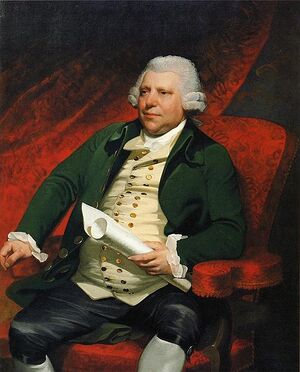Richard Arkwright (nonfiction): Difference between revisions
(Created page with "thumb|Sir Richard Arkwright.Sir '''Richard Arkwright''' (22 December 1732 – 3 August 1792) was an English inventor an...") |
No edit summary |
||
| Line 21: | Line 21: | ||
[[Category:Nonfiction (nonfiction)]] | [[Category:Nonfiction (nonfiction)]] | ||
[[Category:Engineers (nonfiction)]] | |||
[[Category:Industrialists (nonfiction)]] | |||
[[Category:Inventors (nonfiction)]] | [[Category:Inventors (nonfiction)]] | ||
[[Category:People (nonfiction)]] | [[Category:People (nonfiction)]] | ||
Latest revision as of 16:09, 21 June 2017
Sir Richard Arkwright (22 December 1732 – 3 August 1792) was an English inventor and a leading entrepreneur during the early Industrial Revolution.
Although his patents were eventually overturned, he is credited with inventing the spinning frame, which following the transition to water power was renamed the water frame. He also patented a rotary carding engine that transformed raw cotton into cotton lap.
Arkwright's achievement was to combine power, machinery, semi-skilled labour and the new raw material of cotton to create mass-produced yarn. His skills of organization made him, more than anyone else, the creator of the modern factory system, especially in his mill at Cromford, Derbyshire, now preserved as part of the Derwent Valley Mills World Heritage Site.
Later in his life Arkwright was known as the "father of the modern industrial factory system."
In the News
Fiction cross-reference
Nonfiction cross-reference
External links:
- Richard Arkwright @ Wikipedia
